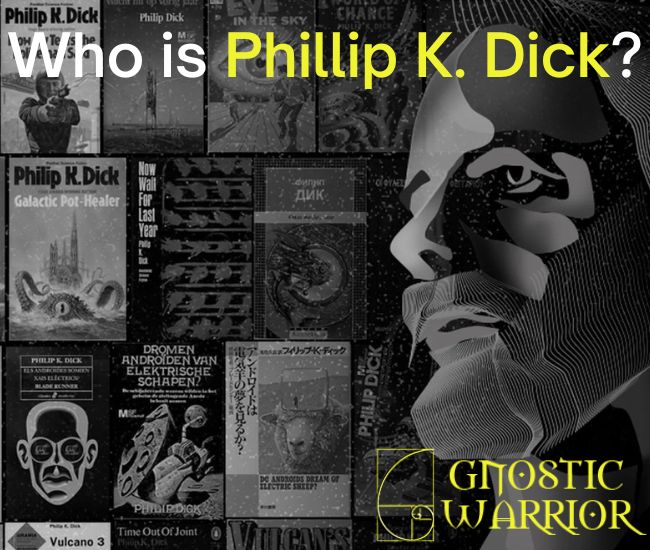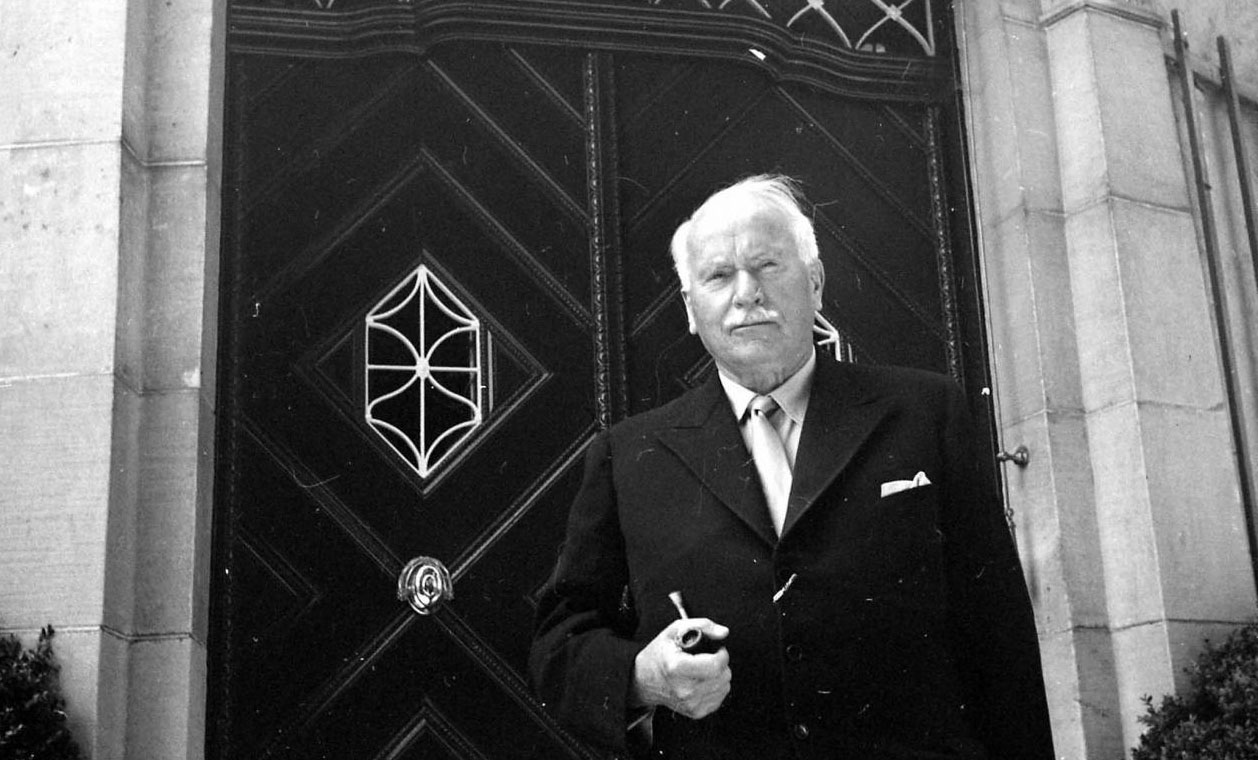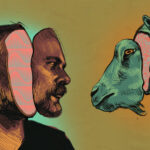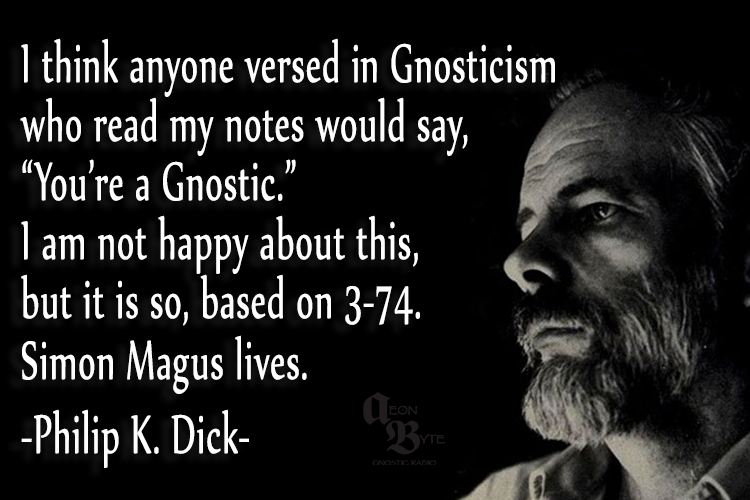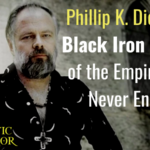Philip K. Dick (1928-1982) is one of the most celebrated science fiction writers of the 21st century.
He published 44 novels and 121 short stories in his lifetime and his books have been adapted into video games, television shows, and films including Total Recall, Minority Report, Blade Runner, The Man in the High Castle, and A Scanner Darkly.
Dick was an American who has been described as a Gnostic, a countercultural figure, a philosopher — and at the same time, he’s been called crazy and a drug addict. For example, he admitted that almost every book he wrote was done under the influence of amphetamines (Meth or Speed).
But as with many of the world’s greatest thinkers, a touch of madness and personal life issues are no reason to throw this authentic baby out with the dirty bathwater.
As was the case with Phillip K. Dick (PKD).
Dick once described all his novels as books that “try to pierce the veil of what is only apparently real to find out what is really real.”
And that is exactly what he did, which I believe has made him one of the greatest modern Gnostic thinkers of our time.
One of Dick’s most famous Gnostic theories was that of the Black Iron Prison (BIP), which he described as an invisible complex life form (organism) that was a criminal virus and was self perpetuating.
Its human representatives were the Roman Empire, which he claims never ended, they just went underground.
According to Dick, the Black Iron Prison was not just a living parasitical organism that could commandeer our minds and bodies to make us its puppets, it also had also managed to weave its filamental web into a totalitarian world government ruled by an elite consisting of powerful corporations and individuals who have enslaved most of humanity for thousands of years.
Think of the Black Iron Prison as a synonymous term to the Matrix to describe our world and the hidden realities which govern it as it exists today.
Dick shares through his many novels and his own personal story about being a prisoner trapped within it.
DICK’S VISIONS
In 1974, while Dick was recovering from the after-effects of prescription drugs for the extraction of an impacted wisdom tooth, he received a home delivery of his meds from a beautiful young woman.
When he opened the door, he was awestruck by the dark-haired girl’s beauty, and was especially fascinated by her golden necklace with fish-shaped design.
He asked her what it meant, and as she was leaving, she replied: “This is a sign used by the early Christians.”
Dick called the symbol the “vesicle pisces”.
After the mysterious woman had departed, Dick began experiencing strange hallucinations.
Dick said that the sunlight reflected off the gold pendant, forming a “pink beam” of light that mesmerized him as if it imparted some special wisdom and clairvoyance, and he also believed it to be intelligent. On another occasion, he claimed that the pink beam gave him information that his infant son was ill. He rushed his son to the hospital, where the illness was confirmed by a doctor.
Dick spoke of it as a revelatory event that made him sane. He told Charles Platt:
“I experienced an invasion of my mind by a transcendentally rational mind, as if I had been insane all my life and suddenly I had become sane.”
Carl Jung’s Influence on Dick
Dick said that his thinking and much of his work was heavily influenced by the writings of fellow Gnostic, Carl Jung. It was his thirst for this secret knowledge that had drawn him to Jung’s writings.
“I was reading Jung in the forties when the only book of his in the U.S. was, Modern Man In Search Of A Soul,” [1933] he wrote Patricia Warrick in 1980. “I bought one later book and tried to translate it. I went to the library at U. C. Berkeley and read their translations.
They had translated only the introduction… a few mimeographed pages. Pat, I felt such a hunger for knowledge,” Dick wrote. (pp. 202-203)
His former wife, Anne R. Dick, wrote in the Search for Philip K. Dick;
“About this time [1961] I started reading some of Carl Jung’s writings. Dorothy Hudner had been deeply influenced by Jung’s works, and when she heard about my interest she sent us one of the beautiful Bollingen editions. Both Phil and I read it and soon acquired and read the whole set….Phil studied Jung’s volumes Alchemy Symbols of Transformation in the Mass.
He was interested in Jung’s idea that a new world religion would soon arise, a religion based upon a quarternity instead of a trinity. The fourth force will be, Jung said, the force now regarded as demonic.
This statement had a big influence on Phil.” (p. 60)
@ 103:40 Dick talks about Jung….
The Black Iron Prison’s Most Wanted Crusader
For Phillip K. Dick, the Roman Empire was not only real and still alive, he was a wanted man by its enforcers who wished to silence him.
In a 1977 interview, he claimed that he was followed by the police and that the US government had broken into his home, stealing his work. Dick said;
“As far as my reputation in the United States, I don’t expect ever to have any reputation in the United States except, well, the police once told me that I was a crusader, and they had no use for crusaders.
But unfortunately they didn’t tell me what I was crusading for. I was afraid to ask,
“But what was I a crusader for?”
And they told me that if I did not get out of the county I would be shot in the back, or worse, some night. And I merely took their advice. I left the United States and went to Canada for a while.
But I never found out what I was crusading for. It may have had something to do with my writing. It may have had something to do with my lifestyle, or a combination of both.
But I was too afraid of the police to ask what it was that I was doing.”
Dick stated, “It is impossible to tell how much of our fears were justified. I mean, there were illegal entries, my house was broken into, my files were blown open, my papers were stolen.
We never found out who did it. My attorney said it was the government.
There was no doubt that it was the government. But what they were looking for, I don’t know.
What they thought I was doing, I don’t know. I don’t even know if it was the government. But there were many such illegal entries.” He said.
Later in the interview, Dick claims that CIA and FBI agents were watching his every move – surveiling his home and opening his mail. He said that he even saw his own CIA and FBI files proving so;
“In March of ’74 the CIA operation CHAOS, which was to harass, disrupt and keep surveillance on American dissidents was officially abandoned. So the kind of paranoia which Michel Demuth noted, which was real, was based on the fact that we were harassed, we were under surveillance.
We really were.
There was no doubt about it whatsoever. I’ve seen my CIA file. I’ve seen my FBI file under The Freedom Of Information Act. I was legally allowed to see both files.
The CIA opened my mail. The FBI had a file on me. I’ve seen both,” Dick said.
“I no longer have the sense of the police activity. It depends a little on what you mean by paranoia.
If you mean a psychotic conviction that you are being persecuted, which is not in accord with reality, I don’t think I had that. But, boy, I sure thought the cops were watching everything I did.
And I was correct. I was tipped off by the criminal underground that my house was being watched.
The license plate numbers of every car that stopped in front of my house was taken. And these were not part of my imagination, these were actual events.
Anyone who visited me, their license plate number was written down by the people next door. And I was told that the house was being watched, and eventually that my house would be hit, my files would be opened, my papers would be taken, and so it came to pass.
As I said in the Rolling Stone article on me, when I came home and found my house consisting of nothing but rubble, ruins, chaos, broken windows, smashed doorknobs, blown open files, I said, “Thank God, I’m not crazy. I have real enemies.”
It’s a tremendous relief to discover that somebody really is after me.”
In his book The Penultimate Truth, Dick describes a society in which the Empire rules over time until they control all aspects of human life – from birth to death.
In this world, life has become meaningless and people are confined to small rooms where they spend their lives watching a screen that shows them images of the past, so that they can have at least some illusion of freedom.
In Do Androids Dream of Electric Sheep?, for example, he describes an Earth where many people have emigrated to Mars, leaving behind an overpopulated planet full of poverty and crime.
Apparently, Elon Musk is a Dick fan. In 2016, he said he wanted to build a rocket capable of taking people to Mars and supporting a permanent city on the planet.
In another novel, The Three Stigmata of Palmer Eldritch, Dick describes a future where Earth has been transformed into a commercialized planet run by megacorporations who use drugs to control their customers’ minds.
A world that sounds very much like what we see today with massive pharmaceutical companies who have sovereign status and are pulling in billions of dollars as the Empire requires vaccine mandates for its prisoners citizens to travel and work.
BOOKS BY PHILIP K. DICK
Solar Lottery, 1955.
A Handful of Darkness (short stories), 1955.
The World Jones Made, 1956.
The Man Who Japed, 1956.
Eye in the Sky, 1957.
The Cosmic Puppets, 1957.
The Variable Man (5 short novels), 1957.
Time Out of Joint, 1959.
Dr. Futurity, 1960.
Vulcan’s Hammer, 1960.
The Man in the High Castle, 1962.
The Game-Players of Titan, 1963.
Martian Time-Slip, 1964.
The Simulacra, 1964.
Clans of the Alplhane Moon, 1964.
The Penultimate Truth, 1964.
The Three Stigmata of Palmer Eldritch, 1965.
Dr. Bloodmoney, or How We Got A long after the Bomb, 1965.
Now Wait for Last Year, 1966.
The Crack in Space, 1966.
The Unteleported Man, 1966.
Counter-Clock World, 1967.
The Zap Gun, 1967.
The Ganymede Takeover (with Ray Nelson), 1967.
Do Androids Dream of Electric Sheep?, 1968.
The Preserving Machine (short stories), 1969.
Galactic Pot-Healer, 1969.
Ubik, 1969.
Our Friends from Frolix 8, 1970.
A Maze of Death, 1971.
We Can Build You, 1972.
The Book of Philip K. Dick (short stories), 1973.
Flow My Tears, the Policeman Said, 1974.
Confessions of a Crap Artist, 1975.
A Scanner Darkly, forthcoming.
Deus Irae (with Roger Zelazny), forthcoming.

Moe is the founder of GnosticWarrior.com. He is a father, husband, author, martial arts black belt, and an expert in Gnosticism, the occult, and esotericism.

